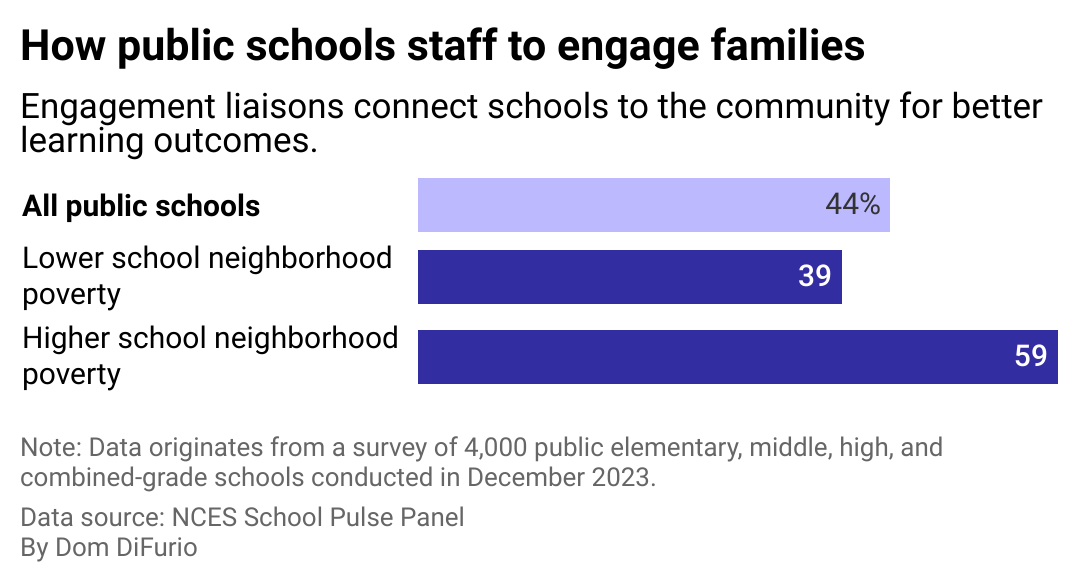What are family engagement liaisons, and why do fewer than half of US schools have one?
George Rudy // Shutterstock
What are family engagement liaisons, and why do fewer than half of US schools have one?
Mom and teenage daughter speaking with a counselor.
Strained relationships between parents and teachers, chronic absenteeism, and disengaged students are just a handful of the ongoing issues in schools across the nation. In response to these concerns, many schools are seeking an innovative solution.
Many schools are taking action by hiring family engagement liaisons to help turn this troubling trend around and improve student outcomes. These professionals work to build a strong support system between parents and teachers to strengthen student well-being. They facilitate communication so that parents and guardians stay informed about their child’s progress with the goal of empowering both parents and students to feel secure in their academic journey.
HeyTutor analyzed data from the National Center for Education Statistics to show where community engagement liaisons are most common.
The relationship between parents and teachers has suffered in recent years due to several systemic issues in U.S. public education. Overworked teachers with limited budgets struggle to provide personalized attention to students, and overcrowded classrooms may make it harder to establish meaningful teacher-student connections. This lack of communication can be frustrating, but when school staff involve parents in decision-making, it strengthens the relationship between teachers and students, benefiting all involved.
Student absenteeism and learning loss are also pervasive problems, exacerbated by the COVID-19 pandemic, shrinking school budgets, and rising class sizes. Fifteen percent of schools reported being “extremely concerned” about student absences, with significantly higher rates of extreme concern (26%) in schools situated in neighborhoods with higher poverty rates, according to the NCES.
The COVID-19 pandemic further strained relationships as schools shifted to remote learning, revealing disparities in access to technology and creating additional stress for families and educators alike. Teachers were overwhelmed with the rapid shift to digital teaching, and many parents found themselves ill-equipped to support their children’s learning at home.
These factors have contributed to a breakdown in communication and collaboration between parents and teachers, necessitating the intervention of family engagement officers, whose primary goal is to create a connection between the schools, educators, and parents.
Research shows that students tend to perform better and remain in school longer when families are involved in their education, and with 44% of public schools employing family engagement officers, the role is particularly important in lower-income communities. The Department of Education provides federal funding via the Title I program to schools with a high percentage of low-income students. These schools are required to connect with families through outreach efforts such as offering resources to build engagement. By fostering strong school-family relationships, student engagement officers are a key resource for parents and teachers alike, playing a crucial role in supporting at-risk students and enhancing their overall achievement.
These officers are less common in the Midwest, where parent volunteerism and participation in school events and parent-teacher conferences tend to be higher. The regional discrepancy indicates a need for tailored approaches to family engagement based on regional and socioeconomic factors.
![]()

HeyTutor
Equipping communities to succeed in learning recovery
A stacked bar chart showing the percentage of schools that have community engagement liaisons based on whether the student population is high or low poverty. Among all public schools, 44% have one. Among lower school neighborhood poverty, it’s 39%. For higher school neighborhood poverty, it’s 59%.
A study by the Harvard Family Research Project underscores the importance of family involvement in education. Students with engaged families are more likely to attend school regularly, perform better academically, and exhibit constructive behaviors. Family engagement officers help foster an inclusive environment so families can actively participate in their children’s education, regardless of their background or circumstances.
Family engagement officers also work directly with families to understand and address the root causes of absenteeism. Chronic absenteeism is defined as a student missing 10% or more of the academic year, which is a significant predictor of academic failure and dropout rates. Poverty, illness, and lack of transportation are underlying factors among many chronically absent students. By connecting families with much-needed resources such as health care, social services, and tutoring, these officers help mitigate barriers to consistent school attendance.
The presence of family engagement officers on campus offers a proactive approach to student support. Their focus on building trust and creating a welcoming environment sharply contrasts with the reactive and sometimes punitive measures of uniformed officers or security personnel. While security is essential for maintaining physical safety, family engagement officers address the issues underlying behavioral problems before they escalate. By focusing on prevention and support, these professionals help facilitate an inclusive school environment.
This proactive stance is crucial in addressing problems before they arise, rather than dealing with the consequences after the fact. Despite formidable challenges, family engagement officers are making a difference through connection and care.
Story editing by Alizah Salario. Copy editing by Tim Bruns.
This story originally appeared on HeyTutor and was produced and
distributed in partnership with Stacker Studio.
